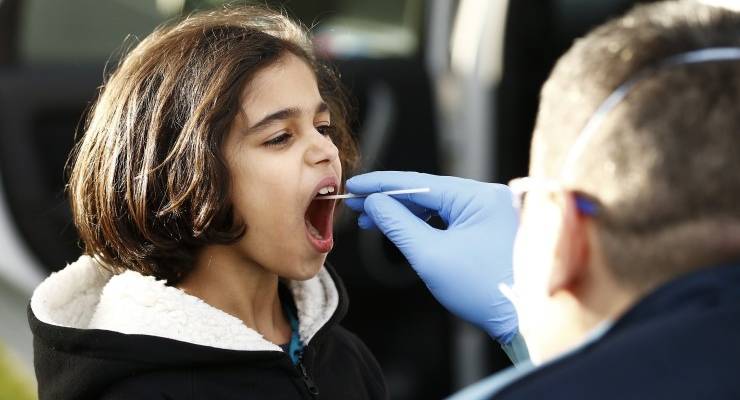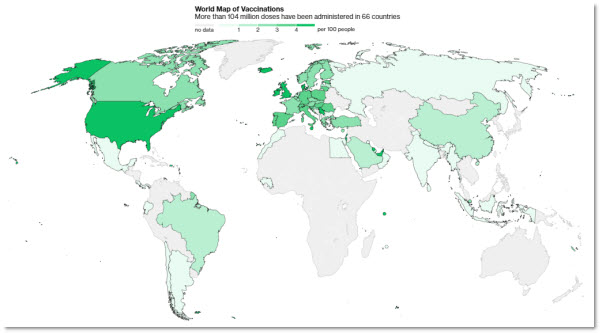
A quick glance at the world map of COVID-19 vaccination rates reveals an unsurprising pattern: it validates predictions that more than half of the world’s vaccines are reserved for one-seventh of the world’s population.
It seems that developing the vaccines was easy compared to the challenge of distributing them in a fair and efficient way.
Vaccine nationalism was always to be expected, and it may be understandable in countries where the virus is killing thousands of people each day. The political economy of COVID-19 is merely following an established trend.
But in Australia — where the current active case count in 55 and there have been five deaths in the past three months — calls to do “whatever it takes” to get ahead of others in acquiring and distributing the vaccines are unprincipled and short-sighted.
Waiting our turn is better for two main reasons.
The first is moral. Healthcare resources are scarce. It is commonly agreed that medical interventions are allocated based on need. The person suffering a heart attack will be triaged ahead of someone with a broken toe — even if the latter arrived first.
In the medium term at least, COVID-19 vaccine supplies will be scarce and precious. It’s a zero-sum game: every administered dose means someone misses out. Ensuring that the worst-affected countries get the vaccine first is critical. Immunising Australians now would be immoral as it would most certainly generate avoidable deaths elsewhere.
The other reason is pure self-interest. Coronaviruses are very prone to mutation. Some mutations can result in a new strain that is more contagious, more lethal or even one more resistant to vaccines. Uncontrolled spread anywhere in the world can yield variants that pose a threat everywhere.
COVID-19 is estimated to cost developed nations around US$119 billion per year, while unequal allocation of COVID-19 vaccines is forecast to slow global economic output by US$1.2 trillion a year.
This isn’t the Olympic Games. It’s a deadly pandemic that needs to be stopped as soon as possible. This means allocating vaccines based on need. Australia’s need is thankfully low.
Waiting our turn is in our best interest — morally, diplomatically, and economically.









Well thought out Luke. Ethically, Australia and the few other countries who have it under control, thus far, have no rights to a vaccine.
An ethical argument could be put to acquire enough vaccine to cover our front line essential workers and those most likely to suffer significant health issues from Covid.
Waiting our turn should not be a major inconvenience. If the UK gets around to vaccinating sufficient numbers and keeps enough for emergent issues, the rest should be on sold to countries in greater need, such as South Africa.
But I’m not sure the UK will get to that point.
Agree on not just South but southern Africa but not sure about the relevance of the UK to Australia in this pandemic?
Surely our peers would be regional, i.e. NZ, Japan, Canada, S Korea, Singapore etc. and if not peers, our working partners in China, India, Vietnam etc.?
Coronaviruses aren’t prone to mutation. They contain an exoribonuclease, which is a proof-reading mechanism.
That said, countries need to get the virus under control. With a large amount of virus circulating in communities, the lowish rate of mutations encourages the development of strains better able to proliferate and dominate, whether by being easier to transmit, producing more virus and illness or being resistant to the vaccines being used.
Having a lot of virus circulating and vaccinating at the same time just runs the risk of getting vaccine resistant virus making the vaccination useless.
“Having a lot of virus circulating and vaccinating at the same time just runs the risk of getting vaccine resistant virus making the vaccination useless.”
Bingo!…but mass vaccination will not prevent infection.
Agree, and interestingly Australia did not follow the US or UK but apparently liaised with various nations including those in our front yard of Asia, who had experience in these matters?
Australia could benefit in soft diplomacy regionally, giving support/resources and breaking down some negative stereotypes of ourselves, amongst our neighbours.
This is opposed to the stances our govt. takes, promoted or caused by LNP and media, in a rush to support US/UK policies or culture, iduring the past two decades (viewed by many as return to proxy white Oz policy or colonial attitudes on immigration, trade etc.).
The OECD has had more than just a healthy interest in the distribution of vaccines. As a consultant or any other occupation that is close to it’s subject matter there is always the risk of journalism with a vested interest ..ie..Adam Schwab recently copped a pasting in the comments section here over his articles and their implied inference toward his Travel Agency business.
But when it suits their political agenda the critics and commenters here are unsurprisingly absent.
Except me. I am not a hypocrite like them. So if you have any vested interests please leave them at the door.
Thanks Luke
In short, behind many vague sentences, one assumes you have antipathy towards vaccines and vaccination?
This article is either a press release or a paid up advertorial. IT IS NOT A NEWS ITEM.